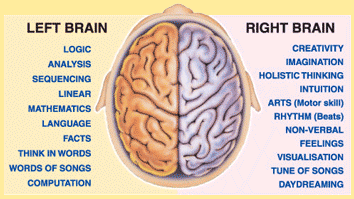
Part of the reason I developed Integral Deep Listening was because I was naturally highly intuitive in a number of ways but found I couldn’t trust my intuition or that of others because I found it highly unreliable, and sometimes trusting intuition got me into big trouble. Therefore, I was searching for a way to honor and validate intuition without using it to validate simple prepersonal irrationality and unhinged belief.
I had an interesting talk with my daughter Kira last night. She was talking about how she is good at sizing people up, is usually right, and has gotten her highly analytical boyfriend Aaron to finally agree that her intuition is generally correct on such things.
I explained to her how, after being a fervent believer in intuition for years, I am highly suspicious of it because i think it is over-rated, it usually doesn’t describe anything that can be measured, quantified or falsified and therefore disproven, and is often used for manipulative psychological ends, as revealed by the response you get when you question someone about how they know what they know – they tend to get defensive and take it as a personal attack.
Kira said that she and Aaron had talked about it a lot and had come to an agreement on a common understanding of what they mean by “intuition,” and it’s one I also agree with. It is certainly less than what psychics and gurus mean by “intuition,” but it is at least some definition that I do not think is totally delusional.
That is, that intuition is right-hemisphere brain awareness, meaning perception based on non-verbal spatial awareness, that looks for patterns and configurations, similarities, is spontaneous, affective and derives meaning from stories. What is interesting is that I value all of these qualities and am particularly good at seeing and making sense of patterns. I have had a strong affinity for most of these qualities all my life.
The difficulties I have with intuition may therefore largely be a matter of language. If someone says, “I trust my intuition on that” I will tend to wonder what the hell they mean, if anything. Do they mean they trust God? Their feelings? Their “still small voice? If so, what the hell is that??” Their “heart?” Okeee…. We can see how well that works with soul mates…
Does it mean they are ignoring their left hemisphere? That is my suspicion.
So it is clearer to me if someone were to say, “I am getting a strong right-hemisphere sense of truth about this and I have really been trying to use my left hemisphere skills to make sure I am not deluding myself.”
Now no one is actually going to say that, but I am trying to communicate an approach in shorthand. What that says to me is that a person is validating their strong right-hemisphere “feelings”” or “intuitions” of truth with left hemisphere strengths.
If I know someone is trying to do this, what else can they do? In other words, I respect that.
Really, a lot of my work with dreams is about attempting to honor, respect and balance both hemispheres.
I suppose what I do when I have a strong intuition, for instance any clear wake-up call or sense of importance, such as a dream – in fact pretty much WHAT I do when I have a strong intuition or non-rational experience, again, like a dream, – is go down the list of left-hemisphere strengths and see if my intuition just represents right hemisphere perception or whether it also can meet left hemisphere criteria of considering other explanations, can be put into some measurable form by which it can be held accountable, can be transcribed into structures of thought and action that are reliable and directs feelings in caring, loving ways.
In other words, if I want whole-brain or integrated living I have to consult, balance and integrate the strengths of both hemispheres.
People who rely too heavily on reason and logic discount the strengths and possibilities of the right hemisphere while people who rely too heavily on intuition, whatever they may call it, discount the strengths and possibilities of the left hemisphere.
In my experience, almost all of us think we have that balance pretty well figured out.
In my experience, almost no one has that balance figured out.
